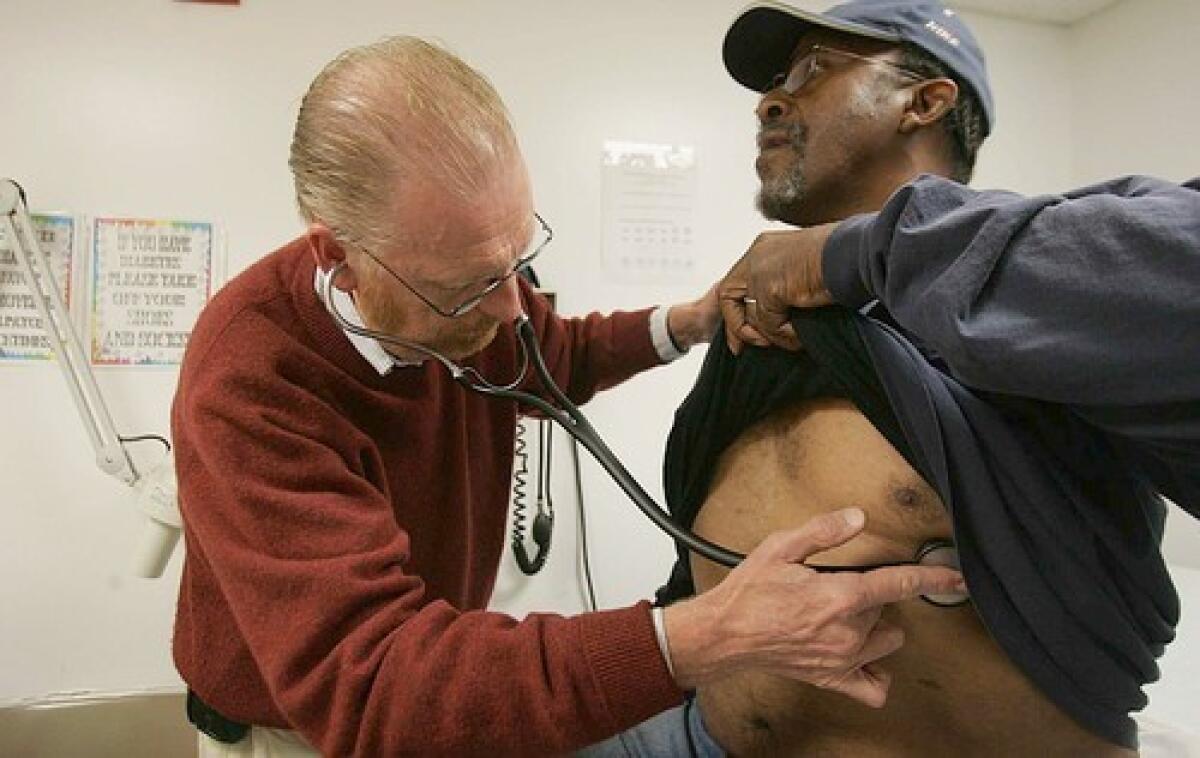California may soon push doctors and lawyers to confront their biases

- Share via
SACRAMENTO — Doctors, nurses, lawyers and court workers in California may soon be asked to confront their prejudices under a trio of legislative proposals that are headed to the desk of Gov. Gavin Newsom.
The Legislature passed the final bill on Thursday, one of two approved this week that would mandate implicit bias training as a continuing education requirement for many medical professionals and court workers. A third measure that passed this week is aimed at ensuring pregnant black women receive equal treatment with similar training for those involved in perinatal care.
“The assumption is, if you put on a [judge’s] robe, if you put on a [doctor’s] coat, you are impartial,” said Assemblywoman Sydney Kamlager-Dove (D-Los Angeles), author of two of the bills. “That is not so because the people in those robes and in those coats are humans, and we all have prejudices, and we all have biases.”
The bills are meant to help address documented disparities in medical and criminal justice outcomes based on race or other factors including gender, sexual orientation, age and disabilities.
Studies have shown that black people in particular face subtle discrimination that can cause them to receive subpar medical treatment or harsher punishments in courts, inequities that can have life-or-death consequences, Kamlager-Dove said.
For example, black women nationwide are three to four times more likely than their white counterparts to die from childbirth. Studies show that the risk for black pregnant women cuts across socioeconomic lines and affects black women “at a moment in time when women are the most vulnerable and we are the most reliant on healthcare professionals to guide us through,” said state Sen. Holly Mitchell (D-Los Angeles), author of the third bill focusing on perinatal care.
“For a Serena Williams to have an episode, how could we suggest it’s poverty, lack of access to prenatal care?” Mitchell said, referring to health complications faced by the tennis star after the 2017 birth of her daughter. “This is deeper and a bigger issue.”
Studies have also found that black defendants in the criminal justice system face harsher charges, and black juveniles are charged as adults more often than white juveniles. Kamlager-Dove said her husband, a lawyer, faced such bias when he went to drop off papers at court and was asked by the clerk whether he was a criminal there to surrender.
“And he said, ‘I am in your courtroom every day,’” she said. “If it’s happening to the person who knows the law, it’s happening to the person who needs the law.”
Implicit bias researchers contend that these disparities in treatment are often the result of subconscious attitudes and beliefs, rather than explicit racism. The proposed training is intended to help people recognize both the personal and systemic consequences of stereotypes, Kamlager-Dove said. While she doesn’t see implicit bias training as a “silver bullet,” she believes it is part of a “long game” to address unintended racism.
“We tiptoe around race. We tiptoe around poverty. We tiptoe around injustice when quietly we understand that we are also part of the problem because no one wants to say, ‘I am a racist,’ or ‘I have bias,’” she said. “If someone who looks like you is talking to you about your bias, then in your own quiet time, hopefully you will have the conversations you need to have with yourself.... And over time, hopefully you will see a reduction in those knee-jerk assumptions that you make which lead to decisions that are based in bias.”
Kamlager-Dove originally introduced a fourth implicit bias bill that would have required training for law enforcement officers. That bill was held in committee after the passage Assembly Bill 392, legislation signed by Newsom in August that changes the state’s use of force law and will require extensive training including implicit bias. Lawmakers also passed Senate Bill 230 recently to provide funding and direction on deescalation techniques and use of force for law enforcement. Because of the scope of those measures and the significant task trainers face in trying to implement them, legislators have largely decided to hold other bills affecting law enforcement this session.
If signed by the governor, Assembly Bill 241 would require organizations that certify and provide continuing education classes for doctors, surgeons, nurses and physician assistants to have an implicit bias curriculum beginning in 2023. And Assembly Bill 242 would require that all court staff members who interact with the public to receive two hours of implicit bias training every two years beginning in 2021, and that lawyers take such training as part of their continuing education beginning in 2023.
Many continuing education offerings for medical and legal professionals already include some implicit bias training, but the new laws would set stricter requirements. Judges aren’t included in the law because the Legislature cannot compel training for jurists, but California Supreme Court Chief Justice Tani Cantil-Sakauye in March expressed a desire to make implicit bias training available for judges.
Senate Bill 464, known as the California Dignity in Pregnancy and Childbirth Act, requires implicit bias training for perinatal professionals. It also contains state reporting requirements to track outcomes for pregnant women, and mandates hospitals and birth centers to provide information on how patients can file discrimination complaints.
The issue of implicit bias has gained national prominence in recent years, particularly around black maternal mortality, sparking federal legislation and discussion from Democratic presidential candidates. The California proposals go a step further by creating laws to mandate action.
“This is pretty new,” said John Dovidio, a Yale psychology professor who studies implicit bias. “There has been a big increase in not only attention to implicit bias, but with people wanting to take action to address implicit bias.”
More to Read
Sign up for Essential California
The most important California stories and recommendations in your inbox every morning.
You may occasionally receive promotional content from the Los Angeles Times.











